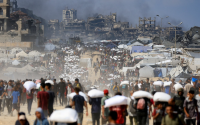Quotes for the first anniversary of our most recent Iraqi War:
Donald Rumsfeld on the handing over of "sovereignty" to Iraqis on June 30: "Will it happen for sure? Who knows? I don't know what's going to happen tomorrow." (Reuters, 3/17/04)
On the week when casualties soared, a Baghdad hotel came down, and the "coalition" in Iraq began to fray and fall away, "This was planned as 'Iraq week,' one [Bush administration] official said." The question, of course, was: Who exactly was doing the planning? (The San Francisco Chronicle, 3/17/04)
Paul Wolfowitz, leading neocon and deputy secretary of defense, becomes a revisionist historian on the eve of the first anniversary of the war. In an interview with Howard Arenstein of CBS radio:
"Q: But also it's been without finding those stockpiles of weapons of mass destruction that you told everybody were there.
"Wolfowitz: Sorry. We never said there were stockpiles. What we said was that after 12 years and 17 UN resolutions, 12 years of this regime defying the United Nations and at a very high price to his regime which suggests he had something to hide and we found some of what he was hiding, that it was time to come clean. There was the unanimous resolution of the Security Council that said it's time to come clean."
I guess "never having said it" means never having to say you're sorry.
Finally, on the first anniversary of the Vietnam (oops, Iraqi) War, this "light at the end of the tunnel" comment from U.S. Army Maj. Gen. Martin Dempsey, overall commander of U.S. operations in Baghdad. While predicting violence without end in Iraq, he concludes: "We are winning. And the enemy is evolving in a way that is somewhat predictable." (San Jose Mercury News, 3/18/04)
One year too late
So let's do a little round-up of first anniversary developments. It looks like the Spanish vote and the decision of the new Spanish prime minister to follow his party's long-term position on the Iraqi war and occupation by withdrawing his country's troops at the end of June (barring a major UN takeover) were a bit like yelling "Fire!" in your classic crowded theater. Fastest to the exit were the Hondurans with 370 troops. ("The decision was announced by Defense Secretary Federico Breve only one day after Honduran President Ricardo Maduro said the troops would stay. Breve said the Honduran decision 'coincides with the decision of the prime minister elect of the Spanish government.'" {Los Angeles Times, 3/17/04) It is rumored that El Salvador and Guatemala may soon follow suit.
Next came the Dutch. The opposition Labor Party called last Tuesday for a July withdrawal of their contingent of troops (while a Dutch civilian died in ambush in Baghdad this week). When Prime Minister Jan Peter Balkenende met with President Bush later in the week, he refused in person to commit his country's troops beyond July.
Almost immediately, the South Koreans rushed for the doors, announcing that they would not, as had been planned, send several thousand troops to the northern city of Kirkuk, a flashpoint of Kurdish desire (Hans Greimel, AP, 3/19/04). They are, claimed the government, looking for a new, safer place to put their troops. (Is there an offshore island around?) The Polish President Aleksander Kwasniewski, the staunchest of staunch "coalition" allies, promptly claimed his country had been hoodwinked -- the actual word he used was "misled" -- on Iraq's weapons of mass destruction. (Monika Scislowska, AP, 3/18/04) (What his government was really hoodwinked on was its share of the spoils of Iraq's "reconstruction" and this may be but a warning shot across the bow of the all-American reconstruction effort.)
The German Foreign Minister Joschka Fischer promptly announced that NATO was far too overstretched to consider future deployment to Iraq. While that truly staunch, if seldom noticed, coalition ally Prime Minister John Howard of Australia began to publicly fret about how developments in Iraq would affect his election prospects next year. And so it went among the "allies."
In Iraq itself, blood continues to flow. American casualties have again risen precipitously. Only yesterday three American soldiers died in a mortar attack and today two Marines were reportedly killed, bringing the number of GIs who died in the last week to 15 (and that's not counting the two who died yesterday in a firefight in Afghanistan) according to Antiwar.com. Foreign and Iraqi civilians -- translators, missionaries, aid workers, CPA officials, cleaning women at American bases, Iraqi journalists, Arab businessmen -- have also died in the last week or so, along with ordinary civilians, victims of brutal car bombings and simply of the atmosphere of mayhem and violence. It was announced that ten Iraqis had died yesterday -- ten being about as high as Americans can count when it's Iraqi dead we're dealing with. Last weekend, the San Francisco Chronicle's Sunday Insight section created our first "Iraq Wall," a full section of the Sunday paper with little photos of all the American military dead in Iraq. (These can be viewed in somewhat different form by
clicking here.) It was sobering indeed and should give us all pause on this anniversary date.
As I've said for a long time, the irony of all this is that the Bush administration's strategists planned to drive through the soft underbelly of the Middle East -- the Iraqi military was known to be in a desperate state before the war -- and consequently change the "map" of the area. And so they have. But the unexpected result has been the rise of a ragtag insurgency with a plethora of groups and undoubtedly individuals, including Baathist thugs and killers as well perhaps as outsiders and Iraqis who simply hate the idea of being occupied, who find themselves in the driver's seat and are driving this administration into a hole. (Vice President Cheney's recent "Iraq Week" speech, attacking Senator Kerry's national security credentials, for instance, played on some TV channels on a split screen with the destroyed and smoking Lebanon Hotel.) Among the most eloquent statements on the one-year anniversary of the launching of the Iraq War was James Carroll's Boston Globe column, "The Bushes' New World Disorder" (3/16/04), in which he concludes, "Whatever happens from this week forward in Iraq, the main outcome of the war for the United States is clear. We have defeated ourselves." He wrote in part:
"The situation hardly needs rehearsing. In Iraq, many thousands are dead, including 564 Americans. Civil war threatens. Afghanistan, meanwhile, is choked by drug-running warlords. Islamic jihadists have been empowered. The nuclear profiteering of Pakistan has been exposed but not necessarily stopped. Al Qaeda's elusiveness has reinforced its mythic malevolence. The Atlantic Alliance is in ruins. The United States has never been more isolated. A pattern of deception has destroyed its credibility abroad and at home. Disorder spreads from Washington to Israel to Haiti to Spain. Whether the concern is subduing resistance fighters far away or making Americans feel safer, the Pentagon's unprecedented military dominance, the costs of which stifle the US economy, is shown to be essentially impotent."
And oh yes, just to put that special exclamation point on the week, according to the New York Times (3/19/04)today, the globe's preeminent shop-till-you-drop nuclear proliferator, Pakistan, has officially been designated by Secretary of State Colin Powell as "a major non-Nato ally," so we can proliferate a little more of our "military technology" and "surplus weaponry" its way.
At this moment, when, for the first time in a year, demonstrators are again in some numbers planning to take to the streets of major cities tomorrow, it's good to be reminded of exactly what a pack of lies and manipulations got us where we are today. Dilip Hiro, an expert on Iraq's long and catastrophic modern history as on Iran's, and on Islamist terrorism, has offered a reminder of several salient moments in the Bush administration's quick-march to war that should have driven several Polish presidents and most of the rest of us crazy. Hiro has been an admirable chronicler of our sorry relations with Iraq since the days when we supported Saddam Hussein as a regional bulwark in the Middle East. Among his many books, his most recent -- and right now most relevant -- is Secrets and Lies: Operation "Iraqi Freedom" and After. As for me, I'll be out marching tomorrow with a sign that, in honor of the Spanish voters and with a nod to Dilip Hiro, will simply read, "Lies!"
[This article first appeared on Tomdispatch.com, a weblog of the Nation Institute, which offers a steady flow of alternate sources, news, and opinion from Tom Engelhardt, long time editor in publishing and author of The End of Victory Culture and The Last Days of Publishing.]






